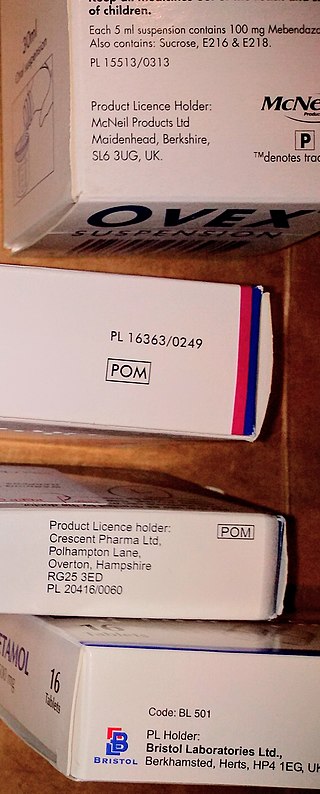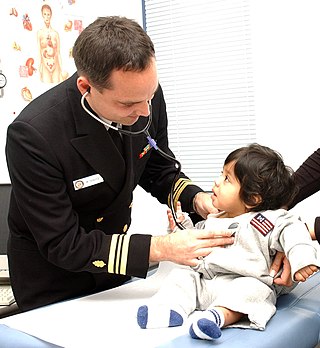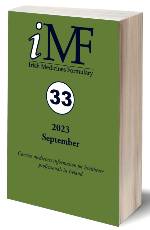
A pharmacist, also known as a chemist in Commonwealth English, is a healthcare professional who specializes in the preparation, dispensing, and management of medications. A pharmacist provides pharmaceutical advice and guidance, often serving as a primary care provider in the community, and offering other services, such as health screenings and immunizations.

Pharmacy is the science and practice of discovering, producing, preparing, dispensing, reviewing and monitoring medications, aiming to ensure the safe, effective, and affordable use of medicines. It is a miscellaneous science as it links health sciences with pharmaceutical sciences and natural sciences. The professional practice is becoming more clinically oriented as most of the drugs are now manufactured by pharmaceutical industries. Based on the setting, pharmacy practice is either classified as community or institutional pharmacy. Providing direct patient care in the community of institutional pharmacies is considered clinical pharmacy.

A prescription drug is a pharmaceutical drug that is permitted to be dispensed only to those with a medical prescription. In contrast, over-the-counter drugs can be obtained without a prescription. The reason for this difference in substance control is the potential scope of misuse, from drug abuse to practicing medicine without a license and without sufficient education. Different jurisdictions have different definitions of what constitutes a prescription drug.
The Pharmaceutical Benefits Scheme (PBS) is a program of the Australian Government that subsidises prescription medication for Australian citizens and permanent residents, as well as international visitors covered by a reciprocal health care agreement. The PBS is separate to the Medicare Benefits Schedule, a list of health care services that can be claimed under Medicare, Australia's universal health care insurance scheme.

A nurse practitioner (NP) is an advanced practice registered nurse and a type of mid-level practitioner. NPs are trained to assess patient needs, order and interpret diagnostic and laboratory tests, diagnose disease, prescribe medications and formulate treatment plans. NP training covers basic disease prevention, coordination of care, and health promotion.
An essential medicines policy is one that aims at ensuring that people get good quality drugs at the lowest possible price, and that doctors prescribe the minimum of required drugs in order to treat the patient's illness. The pioneers in this field were Sri Lanka and Chile.
Academic detailing is "university or non-commercial-based educational outreach." The process involves face-to-face education of prescribers by trained health care professionals, typically pharmacists, physicians, or nurses. The goal of academic detailing is to improve prescribing of targeted drugs to be consistent with medical evidence from randomized controlled trials, which ultimately improves patient care and can reduce health care costs. A key component of non-commercial or university-based academic detailing programs is that they do not have any financial links to the pharmaceutical industry.
The NHS treatments blacklist is an informal name for a list of medicines and procedures which will not be funded by public money except in exceptional cases. These include but are not limited to procedures which the National Institute for Health and Care Excellence (NICE) has ruled of limited effectiveness and particular brand name medicines. In 2017 there was a proposal for 3,200 over-the-counter (OTC) drugs to be restricted and 18 procedures to be added to the list. This generated some controversy amongst doctors with some arguing that OTC should be blacklisted instead, and others believing the move did not take into account individual patient needs.
Many developing nations have developed national drug policies, a concept that has been actively promoted by the WHO. For example, the national drug policy for Indonesia drawn up in 1983 had the following objectives:
Pharmaceutical policy is a branch of health policy that deals with the development, provision and use of medications within a health care system. It embraces drugs, biologics, vaccines and natural health products.

A pharmacy is a premises which provides pharmaceutical drugs, among other products. At the pharmacy, a pharmacist oversees the fulfillment of medical prescriptions and is available to counsel patients about prescription and over-the-counter drugs or about health problems and wellness issues. A typical pharmacy would be in the commercial area of a community.
Electronic prescription is the computer-based electronic generation, transmission, and filling of a medical prescription, taking the place of paper and faxed prescriptions. E-prescribing allows a physician, physician assistant, pharmacist, or nurse practitioner to use digital prescription software to electronically transmit a new prescription or renewal authorization to a community or mail-order pharmacy. It outlines the ability to send error-free, accurate, and understandable prescriptions electronically from the healthcare provider to the pharmacy. E-prescribing is meant to reduce the risks associated with traditional prescription script writing. It is also one of the major reasons for the push for electronic medical records. By sharing medical prescription information, e-prescribing seeks to connect the patient's team of healthcare providers to facilitate knowledgeable decision making.
The term Quality use of medicines is used by the Australian government as part of their policies on effective and correct uses of medicine and access to appropriate medicines.
Online doctor is a term that emerged during the 2000s, used by both the media and academics, to describe a generation of physicians and health practitioners who deliver healthcare, including drug prescription, over the internet.

Irish Medicines Formulary (IMF) is a medicines reference for doctors, nurses, pharmacists and dentists, providing medicines information which is medico-legally relevant in Ireland. It is published in online and print formats, and lists original brands, branded generics and pure generic prescription medicines.
Antimicrobial stewardship (AMS) refers to coordinated efforts to promote the optimal use of antimicrobial agents, including drug choice, dosing, route, and duration of administration.
Pharmacy in the United Kingdom has been an integral part of the National Health Service since it was established in 1948. Unlike the rest of the NHS, pharmacies are largely privately provided apart from those in hospitals, and even these are now often privately run.
Drug recycling, also referred to as medication redispensing or medication re-use, is the idea that health care organizations or patients with unused drugs can transfer them in a safe and appropriate way to another patient in need. The purpose of such a program is reducing medication waste, thereby saving healthcare costs, enlarging medications’ availability and alleviating the environmental burden of medication.
The Medication Appropriateness Tool for Comorbid Health conditions during Dementia (MATCH-D) criteria supports clinicians to manage medication use specifically for people with dementia without focusing only on the management of the dementia itself.
Geraldine Michelle Moses, is an Australian doctor of clinical pharmacy, a consultant pharmacist, and an Adjunct Associate Professor of clinical pharmacy at the University of Queensland. She is a Senior Clinical Pharmacist at Mater Pharmacy Services in Brisbane.





